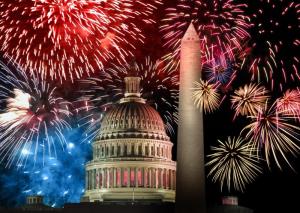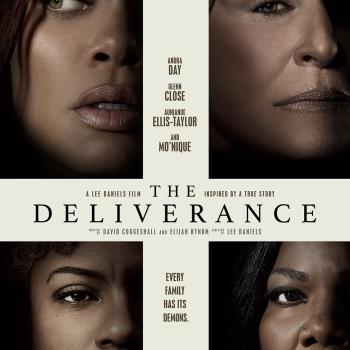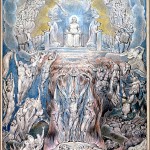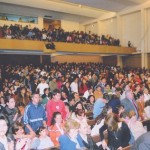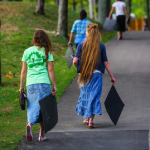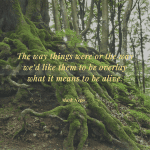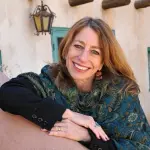I’ve been having great fun with the holidays this year. I made a Halloween costume. I bought candy and put up a jack o’ lantern. Now I’m getting ready for the winter with snowmen decals on my windows, Christmas lights and ornaments for the tree I’m going to buy in a few weeks. In between, I’m bringing an apple cobbler to Thanksgiving dinner with my friends.
The holidays are therapeutic. They give me something to look forward to. For most people, getting excited about the holidays is a way of recapturing the carefree days of childhood. It’s a little different for me. It’s not nostalgia. It’s the creation of a new era.
Halloween was off-limits in my home after I turned 7 and we joined our Message church. I was told, variously, that Halloween was pagan and superstitious, that it was Satan’s birthday and that all the dressed-up trick-or-treaters were the devil’s dupes for the night. I was taught that evil spirits were especially active and that Satan went after the elect especially on that night, when the whole world invited him in by celebrating death and suffering. “The world” might think it was harmless fun, but we knew better. True Christians were serious about Satan’s threat. They didn’t fool around with the devil.
Thanksgiving was an acceptable holiday, because it was premised on the right proportions of Christian spirit and patriotism. It was a time to soberly reflect on how badly America had strayed from the simple godly obedience of the pilgrims, and a time to renew our own gratitude towards God for saving us from the fate of the sinners. We lamented that Americans thought little of the holiday’s origins and merely sat around drinking beer, eating turkey and watching football. Despite this mourning, however, it wasn’t quite as fearful a time as Halloween. It was a sanctioned holiday, as long as we did it right.
Christmas was not so lucky. “Jesus was the Lamb of God, born in the spring like all lambs,” my pastor said. Christmas was the worst kind of evil: a pagan feast appropriated by Catholics. The angst it generated was even worse than Halloween – probably because nobody bothered to defend Halloween’s pure intentions. Either you liked Halloween because it was silly, or you agreed that it was a debauched constellation of diabolic influences. Not so with Christmas.
Over the years that I grew up in the Message, the Christmas tree came and went in my family’s living room. My mother detested it, fought against it, prayed and wept over it. My father, who was not a Message believer, fought back. He argued that she was taking something precious away from him. As much as I was careful to believe what I was told – that people worshiped Christmas trees as part of a druidic pagan past, that giving gifts supported secular consumerism, that God frowned on the adoption of pagan ceremonies by the blasphemous Catholic Church – I still was happier when my dad won the battle. I loved the Christmas tree, the lights, the handmade ornaments from my aunt, and the way presents gleamed under the sparkling boughs. Christmas trees were still magical for me, when we had them.
My friends weren’t so lucky. Many of them didn’t get to celebrate Christmas at all – and they steeled themselves against the disappointment of not receiving gifts by telling themselves that they weren’t tainted by “the world.” Now and then, my parents discussed an economic reality underlying my friends’ ideological stance: My friends’ siblings numbered between 4 and 6. I was an only child.
New Year’s was a night on which we held communion and footwashing, usually in someone’s home, to ring in the new year with penitence and tears rather than celebration. The return of Christ somehow always felt more imminent at the turn of a new year, especially over the millennium. We prayed for His return, for power and strength, and for resilience against the decline of the world political and economic structure. “This world is falling apart,” a fragment of a song by the LaFontaine family, was not just a lyric. It was orthodoxy.
We were also cautioned to be careful of the spirits on New Year’s eve. Driving to church, we felt with heightened senses the ease with which we could be dispatched to heaven by a drunk driver. The debauchery of the night could bleed into dangerous encounters with “the world.” As the hour of Christ’s return drew nearer, the rage and desperation of demonic forces could only increase.
The holidays are not so fraught for me these days. I am teaching myself to experience them as much like a child as possible. This project is complicated, of course, by the fact that I’m the one buying and setting up the scenes of my own enjoyment. I have to do the work of picking out and bringing home a Christmas tree. I have to wrap some of the presents. I have to bake the pumpkin pie. But there is a simple happiness to those activities, too. I’m not ready yet to be the mother who creates this world for a child, because I am still learning how to feel like a child on the holidays myself. It smells like cinnamon and feels like safety. It looks like pumpkins and reindeer. It sounds like jingle bells and tastes like hot chocolate.
This holiday season, I implore those of you who are parents not to raise your children in the fear and uncertainty that I felt throughout my Message youth. There was no simplicity or joy in the holidays for me then. Everything was a life or death struggle. Everything was politics, the end of the world, and demonic influence. That should not have been my foundation for understanding life. It should have been Santa Claus, apple dumplings and silly costumes. It should have been learning to say hello to my neighbors, not fearing them as the unwitting ambassadors of Satan. It should have been excitedly watching the ball drop and thinking about how much more grown-up I’d be in the next year, not repentance for the sins of our nation and disbelief that there would be another New Year’s next year.
I say this not because I believe in the simplistic myth of childhood, that children should be sheltered from reality or made to believe that they will never struggle or go without. I say it because what you do on the holidays defines your worldview. If your worldview is based on fear, danger, conspiracy and control, those are the lessons you teach your child. The world is a hard enough place to live in without having to eradicate decades of terror in adulthood. Live the holidays. Let simple joys be simple joys. Let Santa Claus not be an anagram of Satan, but a cultural myth and a fun, magical experience that all children eventually outgrow.
This holiday season, I am teaching myself to chill out and enjoy the ride. This year, I don’t have to be better than anyone else by avoiding Santa’s face printed on cookie tins or lecturing Christians on the appropriate date for Jesus’ birth (right around the same time as William Branham’s, some Message believers will tell you). This year, I can make gingerbread houses without worrying about demons living in them. I can store my Halloween costume for next year. I can drink wine on Thanksgiving and New Year’s. I get to watch the ball drop and toast 2012, not spend 11:59 face down on a bedspread crying for the end of days or searching my soul lest I drink the homemade vintage unworthily.
Happy normal holidays, y’all!




